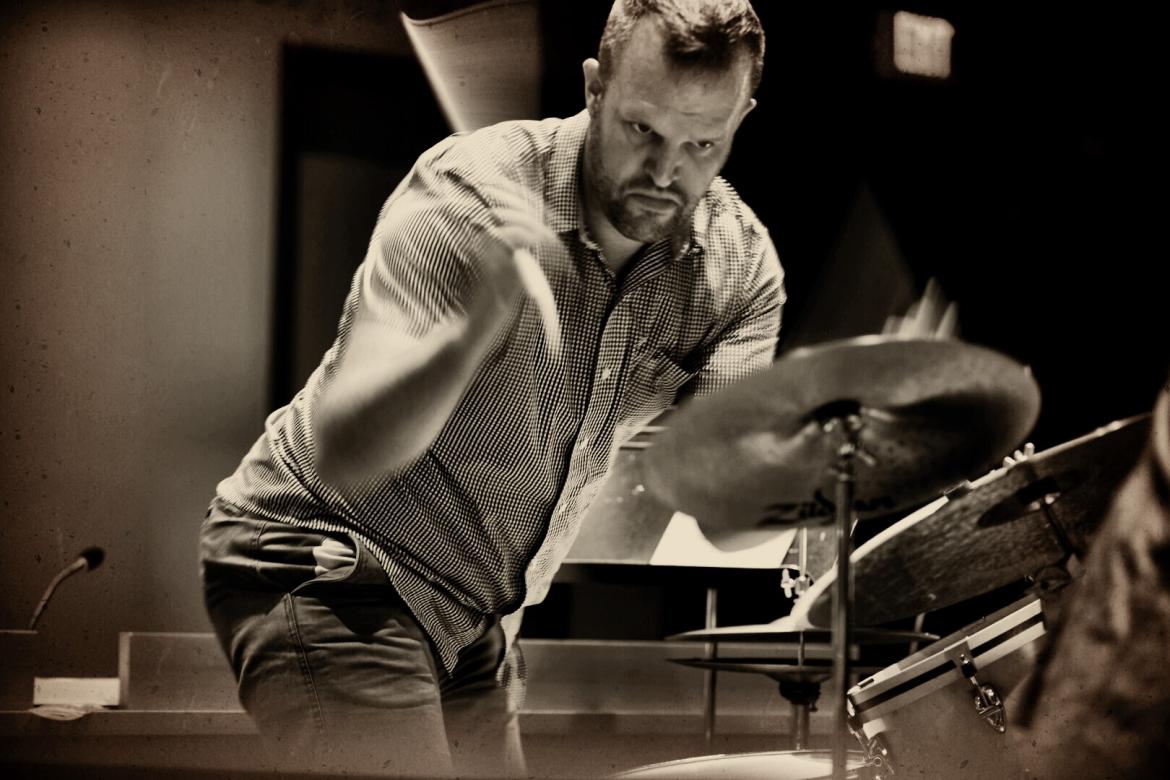
Music Professor and drummer Hans Verhoeven kicks of the Arts and Humanities 2018-19 Colloquium Series by performing Iannis Xenakis’s masterpiece, Rebonds, among the most difficult pieces in the solo percussion repertoire. Photo Credit: Dirk Heydemann
September 24, 2018 - 4:30pm
Free public lecture series hosted by the VIU Faculty of Arts and Humanities covers range of themes
From how drummers, prisoners and 16th Century Scottish women think; to the role graffiti plays in the art world; to an investigation of how media creates a sense of belonging, a free public lecture series at Vancouver Island University (VIU) investigates a wide range of topics.
Every year, Vancouver Island University’s (VIU’s) Arts and Humanities faculty members share their research and open up dialogue on timely issues with a wide audience through the Arts and Humanities Colloquium Series, which take place throughout the fall and spring semesters.
“A broad range of different departments are participating this year, including History, Visual Art, Theatre, Music, English and Media Studies,” says Katharine Rollwagen, a VIU History Professor and Chair of the Colloquium Committee. “It’s a chance for community members to hear about some of the amazing research being conducted in their own backyard by Arts and Humanities professors.”
The series kicks off on Friday, September 28, with a talk by drummer and Music Professor Hans Verhoeven, who will perform Iannis Xenakis’s masterpiece, Rebonds – among the most difficult pieces in the solo percussion repertoire. He will demonstrate different compositional concepts and techniques to help the audience appreciate the piece on a deeper level.
“I will talk about my own process for learning this piece and the combination of mental, aural and muscle memory that it requires, even when one is still ‘reading’ the music,” explains Verhoeven. “To learn a piece like Rebonds, and to be a percussionist in general, demands an extremely agile mind; one cannot rely on old ways of doing things and must constantly be willing to go back to a child-like state of learning and absorbing completely new patterns, movements and ways of doing things, often very quickly and under pressure.”
On Friday, October 19, History Professor Dr. Cathryn Spence will explore how 16th century Scottish women chose to divide up their worldly goods after death. Spence will read out parts of wills – some of which include a few unexpected things – to show what these documents reveal about the society of the day.
“There is an assumption that Scottish women were the same as English women and had very little freedom when it came to making wills and dividing up property, but in fact they had quite a lot of freedom and they weren’t afraid to use it,” she says. “These wills and testaments end up being stories about people’s lives, what they cared about. It all ties into thinking about the documentation we are leaving behind today.
For the final presentation of the fall on Friday, November 23, VIU Theatre Professor Eliza Gardiner will discuss the prison theatre production she directed last year, and relate how her experience working on Antigone with federal offenders at William Head Institution will inform her directing of the Theatre Department’s spring show, Oedipus Rex.
“The skills development and self-discovery made possible through the applied theatre project at William Head diminished stigma associated with criminological behavior because more than 2,000 people visited the minimum security facility to see what the cast and crew created,” says Gardiner. “I am still profoundly impacted by how the incarcerated men considered the deep themes of love, loyalty and the law featured in the Greek tragedy, expressing so artistically the connection between the classic plot and their lived experiences.”
On Friday, January 25, VIU Art and Design Professor Dr. Justin McGrail will delve into the significance of art and artists outside the traditional art world, and consider the challenge of documenting and conserving an urban heritage of anti-preservationist art, i.e. graffiti.
“I’m interested in art that is an unexpected part of urban life, and how it changes the somewhat distant role art has when it is only found in museums,” says McGrail. “I hope audience members will join me in questioning society’s assumptions and judgments about graffiti, street art and vandalism.”
The following month, Dr. Ravindra Mohabeer, Chair of VIU’s Media Studies program, will discuss how people interact with media, and how that affects our sense of place and feelings of belonging to a particular geo-specific locale.
“Through personal stories about the intersection of my media use and my capacity for a wandering mind, the audience will consider how truly ‘present’ any of us actually is,” he says. “It is my hope that the audience will ask questions about the role of media in their own sense of belonging now, in the past, and within the context of ever-changing technologies and mediations of ‘presence.’”
The final presentation of the season will feature Music Professor Sasha Koerbler and English Professor John LePage exploring how German composer Felix Mendelssohn’s Overture to A Midsummer Night’s Dream interacts with Shakespeare’s play of the same name.
The presentations take place in the Malaspina Theatre (Building 310) from 10 – 11:30 am and are followed by a discussion period during which audience members are encouraged to ask questions. Coffee and tea are available in the lobby of the theatre before each presentation.
For more information, visit Colloquium. To view this press release online, visit VIU News.
-30-
MEDIA CONTACT:
Jenn McGarrigle, Communications Officer, Vancouver Island University
P: 250.740.6559 | C: 250.619.6860 | E: Jenn.McGarrigle@viu.ca | T: @VIUNews
Tags: english | History | Media Studies | Music | Theatre | Visual Art | Teaching and Learning





